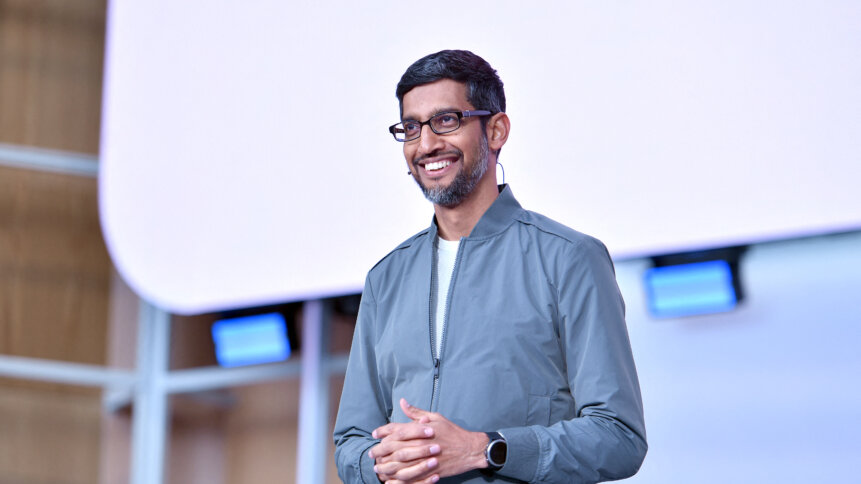Google is coming up with a ChatGPT rival to take on Microsoft

Artificial Intelligence (AI) has been of interest to Big Tech layers long before ChatGPT took the world by storm. The only difference in the way companies like Google, Microsoft, Facebook and others dealt with AI is that most developments were built cautiously and remained in a rather ‘safe’ perimeter. But OpenAI, the company that built ChatGPT, was not as skittish as those tech giants. The company has shown off and tested what a very large, powerful AI system can accomplish.
In fact, just a few days after its launch, more than one million people were already using the AI chatbot. People were amazed as to how knowledgeable the tool seemed in areas where there was good training data for it to learn from. But there’s a catch: ChatGPT doesn’t exactly know anything. It’s an AI that’s trained to recognize patterns in vast swathes of text harvested from the internet, then further trained with human assistance to deliver more useful, better dialog.
While the answers you receive may sound plausible and even authoritative, they might well be entirely wrong, as OpenAI warns. But that doesn’t mean a search engine giant like Google, which has been around for decades, should be too relaxed about this new technology. In fact, there is every reason for it to be challenged, especially after the news that Microsoft recently extended its partnership with OpenAI with a “multi-year, multi-billion-dollar investment.”
That’s not all — the software giant recently even rolled out a premium Teams messaging offering powered by ChatGPT, to simplify meetings using the AI chatbot. On top of incorporating it into its popular office software, Microsoft even has plans to sell access to the tool to other businesses. The cherry on the cake is this: Microsoft is working to incorporate an even faster version of OpenAI’s ChatGPT, known as GPT-4, into Bing, its search engine, within the coming weeks.
For Alphabet, the parent company of Google, that spells intense competition for its search engine. But Google is not entirely oblivious about it. Like most other tech giants, pressure has been mounting on it to move faster. As anticipated, Alphabet’s CEO, Sundar Pichai, during a conference call following the internet search giant’s fourth-quarter earnings report yesterday, admitted that it is devising a plan to compete with ChatGPT.
Pichai said Google will make artificial intelligence-based large language models like LaMDA available “in the coming weeks and months.” Prior to Pichai’s updates, The New York Times (NYT) had reported, quoting people familiar to the matter, that Google had issued a “code red” around launching AI products and proposed a “green lane” to shorten the process of assessing and mitigating potential harms.
“Larry Page and Sergey Brin, Google’s founders, held several meetings with company executives. The topic: a rival’s new chatbot, a clever AI product that looked as if it could be the first notable threat in decades to Google’s US$149 billion search business,” NYT said in its article. In short, Google is threatened — to a point that the search engine now intends to unveil more than 20 new products and demonstrate a version of its search engine with chatbot features this year, according to a slide presentation reviewed by NYT .
Google is just getting started on its ChatGPT journey
In Pichai words during the earnings call; “We are just at the beginning of our AI journey, and the best is yet to come.”A glimpse to how Google would incorporate a ChatGPT-like service into its search engine, Pichai said “Users will soon be able to use language models “as a companion to search.”
YOU MIGHT LIKE

Cybersecurity firms examine ChatGPT threat model
Based on the slide presentation studied by the NYT, Google listed copyright, privacy and antitrust as the primary risks of the technology. Google said that actions, such as filtering answers to weed out copyrighted material and stopping AI from sharing personally identifiable information, are needed to reduce those risks. “For the chatbot search demonstration that Google plans for this year, getting facts right, ensuring safety and getting rid of misinformation are priorities,” the report stated.
Is 2023 the year of generative AI?
Generative AI technology started becoming increasingly popular with services like OpenAI’s ChatGPT, DALL-E, and Midjourney. Also known as Generative Artificial Intelligence, the tech is a branch of AI that focuses on creating new and unique data, such as images, videos, text, and audio. It works on the principle of generating content that is similar to, but not identical to, existing data. It is achieved through the use of deep learning algorithms and neural networks, which are trained on large datasets.
Growing demand to modernize workflow across industries is expected to drive the demand for generative AI applications among industries, according to a report by Grand View Research. The report also says that the global generative AI market size is anticipated to reach US$109.37 billion by 2030, at a CAGR of 34.6% from 2022 to 2030.









